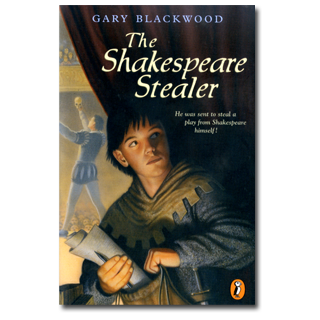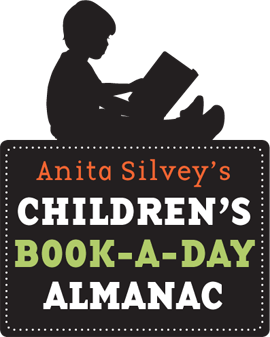
A FEW OTHER EVENTS FOR
APRIL 23:
- Happy birthday William Shakespeare. Here are some other related titles of interest: William Shakespeare & the Globe by Aliki, The Bard of Avon by Peter Vennema, co-authored and illustrated by Diane Stanley, Shakespeare’s Secret by Elise Broach, and Shakespeare Stories by Leon Garfield, illustrated by Michael Foreman.
- In 1635, Boston Latin School, first public school in what will become the United States, is founded. Read The Secret School by Avi, Schooled by Gordon Korman, and Late for School by Steve Martin, illustrated by C. F. Payne.
- It’s Take a Chance Day. Read Take a Chance, Gramps by Jean Davies Okimoto and Cloudy With a Chance of Meatballs by Judi Barrett, illustrated by Ron Barrett. Today marks the first World Book Night. Check out activities in your community.
Today marks both the probable birthday and death day of the most famous author in the English language, William Shakespeare (1564-1616) of Stratford-upon-Avon. In honor of the bard, April 23 has been designated “Talk Like Shakespeare Day.” You can find lots of ideas at TalkLikeShakespeare.org. Call any tormentor a “jackanapes” or “white-livered canker-blossom.” Instead of you, say “thou” or “thee.” And end verbs with the letters -eth. Anyone with a little imagination will have a very good time today, unless you find yourself melancholy pondering “to be or not to be.”
Methinks the best book about Shakespeare, for nine- to fourteen-year-olds, to be Gary Blackwood’s The Shakespeare Stealer, published in 1998. Blackwood knows how to capture all of the excitement, villainy, emotion, and action of a Shakespeare play. Young Widge, orphaned at birth in 1587, spends seven years in an orphanage and then the next seven as an apprentice to an apothecary. His master, Dr. Bright, devised a type of shorthand, which he teaches Widge. Consequently, the young boy can capture any conversation, and then render it in long hand. This skill seals his fate. Simon Bass, a shady character connected to the London theatre, needs a boy with just such a talent. Simon has a bold plan—to copy the lines of Shakespeare’s new play Hamlet, and then make it available for another acting company to perform.
Purchased from Dr. Bright by Bass and then transported to his new home by an evil character called Falconer, Widge sets out to capture every line of Hamlet as it is being performed. He has never really questioned his masters; he follows blindly. Copying down every phrase of Hamlet proves more difficult than he thinks, particularly because he gets swept up in the play. Then Widge is invited to join Shakespeare’s company as an understudy. All the while Falconer stalks him, telling him to steal the official play book and threatening his life. As Widge gains competence as a player, he begins to think for himself. How can he betray these people who have become a family to him? But how can he break away from Bass and Falconer?
With great scenes of swordplay, chases, and duels, The Shakespeare Stealer brings the world of Elizabethan theater and the street life of London alive for young readers. In a book where Shakespeare makes only cameo appearances, Widge performs for Queen Elizabeth herself, who encourages the young man in his choice of career. Blackwood knows how to keep a taut plot line and introduce unfamiliar elements so that anyone can understand them. He has, in short, paid a great tribute to the bard.
So happy Talk Like Shakespeare Day. I hope you have half as much fun celebrating the bard as you will reading about his world in The Shakespeare Stealer.
Here’s a passage from The Shakespeare Stealer:
There was a popular saying to the effect that England is a paradise for women, a prison for servants, and a hell for horses. Prentices were too lowly to even deserve mention.
Eventually our sermon stealing was discovered. The wily old rector at Leeds noticed my feverish scribbling, and a small scandal ensued. Though Dr. Bright received only a mild reprimand from the church, he behaved as though has reputation was ruined. As usual, the blame fell squarely on my thin shoulders. My existence there, which had never been so much to begin with, went steadily downhill.
Originally posted April 23, 2011. Updated for .













OH!!! I LOVE this book! I was a huge fan of Shakespeare books as a kid, and read this one as well as Susan Cooper’s King of Shadows time and time again. Widge is such a funny, observant narrator and the story is complex. It doesn’t just rely on the period or being about Shakespeare, it’s a fabulous story in its own right.
Thanks for the recommendation, m’lady.
I think Cue for Treason by Geoffrey Trease and The Player’s Boy by Antonia Forest are my favorite Shakespeare juveniles but I will look for this one. I read King of Shadows but did not like it as much as most Coopers (was it too short? I don’t recall).
I already commented on Twitter but wanted to add one here. My homeschooled 12 year old and I have been working on a Shakespeare “unit” and just loving it. We’ve read and watched two plays (Henry V and Much Ado About Nothing) and are reading King Lear now. He’s read all three of the Gary Blackwood books and LOVED them, also the Susan Cooper (he’s a big fan since reading VICTORY for our fighting ships/Horatio Nelson unit!) and another “novel in five acts”, ALL THE WORLD’S A STAGE by Gretchen Woelfle.
We also loved the Aliki book (checked out from the library) and one of those -ology-like books from Candlewick (I think). Also useful was a PBS special called “In Search of Shakespeare”, which is streaming on Netflix now and has an excellent supporting website, here: http://www.pbs.org/shakespeare/
I will stop now!
Sarah: Thanks for extending the list and your reports on your son.